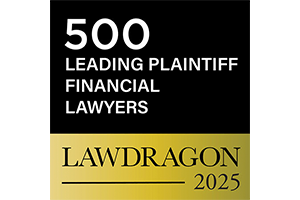Investment Fraud
Austin Investor Wins $2.8 Million in Arbitration on Claims Under The Texas Securities Act



Texas Securities Fraud Attorney
The Forman Law Firm is not a general practice firm that tells clients it can handle every legal problem. The Forman Law Firm is FOCUSED on securities fraud and legal issues in the securities industry.
Investor Representation in Stockbroker and Investment Fraud Claims
The Forman Law Firm is primarily a securities and investment fraud law firm. Bryan Forman has spent more than 30 years as a Texas securities fraud lawyer, working within brokerage firms, for large law firms, and now for his own firm. We represent clients in the securities and investment industries, and our representation covers a wide range of disputes in the investment and securities industry. Our primary practice is representing individual investors in disputes with Wall Street firms, their stockbrokers, advisers, annuity and insurance salespersons, and promoters of all types of private investments. We take great pride in representing those individuals that have been victimized by their stockbrokers, investment advisers, insurance and annuity salespersons, investment promoters, and other financial professionals. We have experience in all types of investment fraud cases, including basic suitability cases, stockbroker fraud, theft cases, selling away cases, illegal borrowing/lending cases, margin cases, option cases, churning cases, cases involving unauthorized trading, and cases involving variable annuities and insurance products. We also handle more complex cases involving margin, stock and index options, promissory notes, REITS, TICs, private placements, binary options, PONZI scheme investments, oil & gas investment schemes, hedge funds, reverse mergers, private investments, and essentially any situation where an investor has made an investment with a third party. Many cases against brokerage firms and investment advisory firms also involve some level of a failure to supervise, where the firm and/or its owners are held legally and financially responsible for failing to detect and prevent the underlying wrongdoing.
Bryan Forman and the Forman Law Firm is experienced in representing investors in virtually every type of claim that can be brought against a broker or investment advisor. We represent clients in Texas and in all states in FINRA arbitrations. These are some of the most common claims filed through FINRA arbitration:
Breach of Fiduciary Duty
Most investors place complete trust in their brokers and/or investment advisors. Investment advisors are fiduciaries pursuant to the Investment Advisors Act of 1940, and FINRA registered stockbrokers can become a fiduciary to a client by undertaking certain duties for the client, and when the relationship involves a special trust, confidence, and reliance on the stockbroker to exercise his or her expertise in acting on the client’s behalf. A fiduciary duty is the highest duty under the law, and when a financial professional acts as a fiduciary, they owe the client numerous duties, including the duty of loyalty and care, the duty of full disclosure, the duty to refrain from self-dealing, and the duty to always put the client’s interests ahead of their own. When a stockbroker or adviser serves as a fiduciary, and fails to adhere to these high and exacting standards, the fiduciary duties can be breached, thus entitling the client to recover their damages.
The securities fraud attorneys at the Forman Law Firm know when a stockbroker or adviser has breached their fiduciary duty, and we know how to prove the breach of fiduciary duty caused the investor recoverable damages.
Suitability
Stockbrokers are required to ONLY recommend suitable investments, after first determining the investor’s investment objectives, risk tolerances, and other financial considerations. The broker must first fully understand the risk and circumstances associated with the investment to be recommended. This is called reasonable basis suitability. There must be a reasonable basis for a qualified investor to invest in the stated investment. Some investments don’t make sense for any investor, and thus would lack reasonable basis suitability. Secondly, a stockbroker must determine the client specific suitability, and learn all of the essential facts regarding the client before making any recommendation to invest. These suitability factors and essential facts include the investor’s age, investment objectives, risk tolerance, level of sophistication, income, net worth, tax status, time horizon, liquidity, income, and liquidity needs. When a stockbroker fails to match the investment to the specific and personal needs and risk tolerance of the investor, the stockbroker has breached the duty to only recommend suitable investments, and the client is entitled to recover damages sustained from the unsuitable recommendation. Suitability claims frequently involve the following:
- The broker fails to understand the underlying investment and its risks
- The broker fails to accurately explain the risks in any investment so that the client can understand the risks, given their level of experience and sophistication
- The broker recommends that the client buy, sell, exchange, or hold the investment when the broker has failed to match the investment to the client’s needs.
As an experienced securities fraud attorney and former owner and executive of brokerage firms, Bryan Forman understands what brokers and investment advisors are supposed to do when recommending an investment or strategy to a client, and he knows when they fail to comply with the suitability duty, and how to recover damages from the breach of those duties.
Churning
Churning is an unscrupulous and fraudulent practice of stockbrokers who seek to generate commissions without regard to the suitability of the investment for the client. If a broker enters a trade (buy or sell) primarily for the purpose of generating a commission, he or she can be found guilty of churning. FINRA considers churning to be a fraudulent and deceptive practice for which an investor can recover damages. Detecting illegal churning is both an art and a science. As an experienced securities fraud attorney, Bryan Forman knows when a broker is entering a trade simply to generate a commission, and when the activity is suitable for the client. Churning operates as a fraud on the investor. When you notice frequent or excessive trading in your account, contact an experienced securities fraud attorney to determine whether you have a claim and are entitled to recover your losses and damages from the fraudulent and deceptive practice of churning.
Unauthorized Trading
A stockbroker is required to get your permission on every single transaction in your account BEFORE the transaction is entered. When a broker executes a trade without your prior permission, the broker has engaged what is called unauthorized trading, a practice that FINRA considers fraudulent and deceptive. Unless you have provided your broker with written discretion to trade your account without consulting with you prior to the transaction, the broker must talk to you before every trade, or they are guilty of unauthorized trading. It is inappropriate for a broker to get your consent after the trade was done, or to tell you that they will buy/sell the investment when they think the time is right—that is still unauthorized trading. If you believe that your broker has entered transactions without asking your permission BEFORE the transaction was complete, you should consult with an experienced securities fraud lawyer and determine whether you are entitled to recover your losses from the unauthorized trading.
Selling Away / Private Securities Transactions
Brokerage firms are required to know what investments their brokers are recommending to the firm’s clients. This is one way the firm supervises its brokers, its client accounts, and the transactions in their clients’ accounts in an effort to detect and prevent wrongdoing by their brokers. However, some brokers ask their clients to invest in deals and other investments that are not known to the brokerage firm or on an approved list of investments that can be recommended. FINRA rules prohibit a broker from recommending an investment away from the firm (or without the firm’s knowledge and approval) without getting the firm’s written consent to the investment. When a broker recommends that a client invest away from the firm, it is called “selling away” and is also known as a “private securities transaction.” Firms are required to detect and prevent selling away from the firm, and if the firm fails to adequately supervise its brokers, it will miss these private deals, and can become liable for a client’s investment away from the firm. If your broker has ever recommended that you loan money to a private company, or invest in any investment that is not approved by the firm, or that does not show up on your monthly statement, your broker may be involved in an illegal private securities transaction, and the brokerage firm can stand liable for all of your losses. If you have invested and lost money in any private investment that you believe was not approved by the brokerage firm, you should consult with an experienced securities fraud attorney to learn your rights and whether you can recover your losses.
Failure to Supervise
Every brokerage firm is required to have established supervisory systems in place to detect and prevent misconduct and wrongdoing. When a brokerage firm does not detect a broker’s unsuitable recommendations, churning, unauthorized trading, risky investments, private securities transactions, or any other activity that potentially harms a public investor, the brokerage firm can be held liable directly for its failure to detect and prevent the harm to the investor. In almost every case where a client has suffered losses and damages due to a broker’s misconduct, the brokerage firm is likely responsible because it failed to detect and prevent the underlying wrongdoing. This is particularly important to investors when their individual broker may not have sufficient assets to pay the client for the losses sustained from the wrongdoing.
FINRA Arbitration
Almost every case against a Wall Street Firm, large commercial bank, insurance company, or the individual stockbroker, registered investment adviser, or annuity and insurance salesperson will require arbitration rather than a lawsuit before a judge and jury. Most disputes against your stockbroker and investment adviser will be before the Financial Industry Regulatory Authority (FINRA), which has its own set of procedural rules and conduct rules governing the claims and defenses in the case. Because of these somewhat arcane and complex rules, and more importantly, the intuition required to effectively represent clients in securities arbitration, your selection of counsel is critical. We don’t believe that victims of stockbrokerage fraud are well-served by hiring a generalist attorney, but are best served by hiring an attorney that is focused on the critical issues and is experienced in the securities industry arbitration process.
A Successful Texas Securities Fraud Lawyer
Bryan Forman has successfully represented investors in lawsuits and arbitrations against many, if not most, of the major Wall Street brokerage firms like Merrill Lynch, Bank of America, Wells Fargo, Morgan Stanley Dean Witter, LPL, Raymond James, Edward Jones, Wachovia, AG Edwards, Smith Barney, and also against many regional and local brokerage firms.
Every case is different, and this is not the type of practice prone to filing “cookie cutter” claims. Our extensive experience in this area enhances our ability to tell YOUR story in the most compelling manner possible to enhance the potential recovery. We will also tell YOU that our goal is not to quickly settle your case, but to optimize your recovery based on the strengths and weaknesses of your case. Through our very thorough preparation and focus, your case will be extremely well-prepared, optimally positioned for settlement, and in the event the case is not resolved, we will take your case to trial or arbitration and seek the maximum amount you deserve, including in most cases money you should have made in a suitable investment, interest on your money, your costs and your attorneys’ fees.
We know that making money is hard, and saving and protecting your money as an investor can be even harder. But if you have lost money through any type of investment, you should contact an experienced Texas securities fraud attorney. Contact the Forman Law Firm to learn your rights and understand your claims, and we will advise you whether you can recover your losses. Call us at 1-866-597-2221 to schedule a free consultation.
Leave Us A Review
Search Our Website
Listen the Radio Ads Run by Forman Law Firm
You Should Be Concerned When
- Your gut tells you that you don’t understand what you are invested in and why.
- You lose more money than you thought you should
- Your broker never tells you how much you might lose
- Your broker avoids your questions, or gives you excuses, not answers
- Your broker doesn’t return your call immediately
- Your broker tells you "don’t worry, it will come back
- Your broker tells you that he or his family own the same things
- Your broker never accepts responsibility for anything
- Your broker enters a trade without getting your permission first
- Your broker tells you after the fact what you invested in
- Your broker asks you to "sign here" or "just sign it and return it" without explaining in detail what you are signing
- Trust your instinct, when you have one of these concerns, call us.
Client Reviews
I can’t thank Bryan enough for his incredible work! He helped us recover our money from an investment fraud case within just one month. Bryan did an excellent job drafting a compelling demand letter and skillfully negotiating with the other party. He is highly professional, knowledgeable, and a true...
I highly recommend Bryan Forman. He helped me navigate a set of circumstances that was unique, complex and emotional-one that many in his field could have easily declined to assist. Instead, he brought his full effort, intelligence and diligence; guided the rest of my legal team assisting me; and...
Got all of my money back, quickly (4-6 weeks) and without arbitration or court involvement! The honest truth is that Bryan was quite knowledgeable in Texas Securities law, has appropriate experience in dealing with securities law and was very firm in his approach with the fraudsters. As my attorney...
We were very fortunate to find Bryan Forman’s law firm through a reference from another lawyer. From our very first conversation with Bryan and Howard, we were put at ease and trusted them unconditionally. They educated us on the process of going through a lawsuit and were very thorough on setting...
If there as an option for 50 star rating i would happily place Mr. Forman that high without any hesitation. I personally would not want to find myself on the opposite side of Mr. Forman’s client ever. Bryan resolved my case very efficiently and successfully before we even had to file a lawsuit...
I hired Bryan to help me with an issue with a financial institution. Bryan and his assistant Melody Bounds were professional and personal while resolving my situation. Bryan's experience and expertise were crucial in the positive outcome. Both he and Melody spent long hours researching and preparing...
Mr. Forman and his staff were always available, professional and answered any questions and concerns we had through every phase of the process. I would highly recommend him.
Our Offices
Tyler, TX 75701







